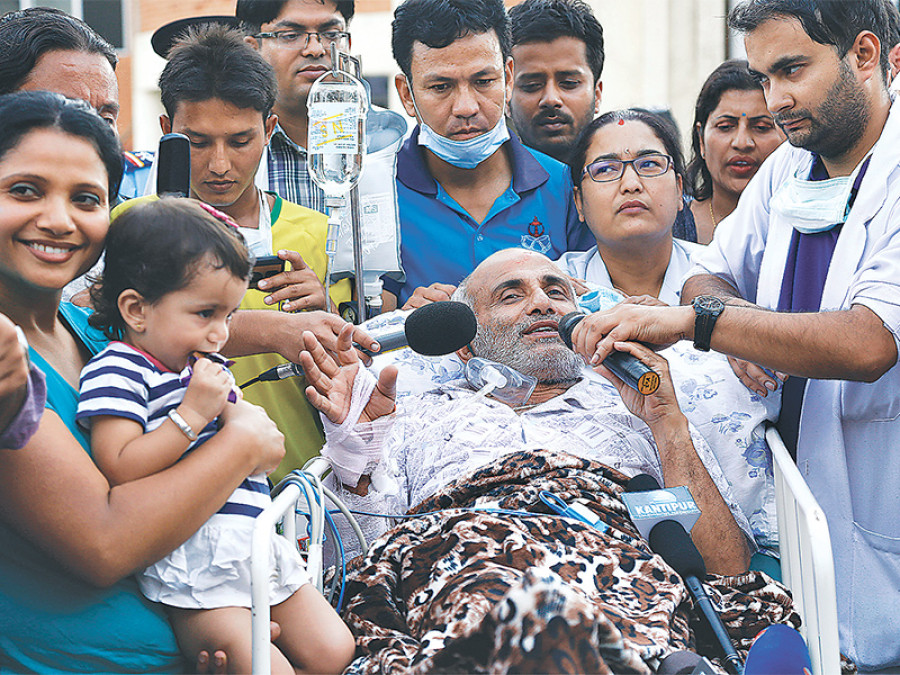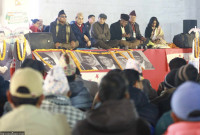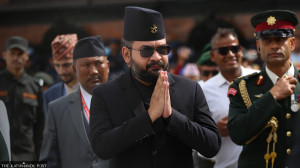Opinion
In pursuit of health
The public will be closely watching how the government will implement its agreement with Dr Govinda KC
Sophia K Tamot
It was a big relief to read on Sunday morning that the government had managed to convince Dr Govinda KC to break his sixth fast-unto-death strike. God forbid that an impending change in government or even a change of priority within the current establishment conveniently brushes the agreement under the carpet. That would be a tragic travesty. But who is to say that it might not happen?
As politicians have such thick hides and do not give a damn about ordinary people, many feared that Dr KC might meet the same fate as Nanda Prasad Adhikari, who was left to die after 332 days of hunger strike despite the noise created by media and human rights activists. Three governments in a row turned a blind eye and a deaf ear to the Adhikari couple’s plea for justice for their murdered son. Fearing a possible backlash if his wife Ganga Maya died as well, the government had signed a five-point agreement promising her that the murderers would be brought to book. Almost a year on, the state is yet to fulfil its commitment.
Another protagonist, together with the recently retired Chief Secretary, who played an instrumental role in brokering the KC deal is Govinda Pokharel, Vice Chair of the National Planning Commission. Let us remember that Pokharel had played a similar role in breaking Dr KC’s fifth hunger strike with the then Chief Secretary a few months ago.
Both Dr. KC and Pokharel not only share a common first name, but also have squeaky-clean reputations, are trusted and have demonstrated noteworthy track records in their respective fields. And both stand by the theory that the government should play the lead role in providing access to quality healthcare for its citizens. However, the similarities end there. While Dr KC’s fight for public interest and medical reform is straightforward and linear, Pokharel faces a much more complex task of having to maneuver between various political interest groups and party lines as he juggles between his role as a mediator and heads of government bodies.
Exposing a mafia
Private institutes, some funded and backed by politicians have strongly condemned the Mathema report. Recommendations such as imposing a Rs 3.5 million fee threshold for medical education have been alleged to be impractical even as medical colleges run by Dhulikhel hospital, one of the best managed hospitals in the country, and Kathmandu’s Teaching hospital are both successfully running courses for under that amount. Of course, private medical colleges cannot afford to successfully run classes within the proposed threshold if they need to recover the money they paid to middlemen, judges, politicians and everyone else involved in getting their license. Recent media reports have clearly demonstrated such practices.
If we look around, the criminalisation of politics and politicisation of state organs are at their peak, and are scary. There is virtually no sector where political infiltration and political division have not seeped in and corrupted the system. Sports, education, media, judiciary, police, bureaucracy, development, business or finance—you name it. Pokharel is perhaps currently the best placed person to attest to the chaos and surrounding political drama that ensued as the National Reconstruction Authority, of which he was appointed CEO of just three weeks ago, now stands suspended. Negligence of this level from the government towards such an important body tasked with rebuilding the nation is a criminal act.
Just try scratching the surface and the amount of dirt that is uncovered can be uncomfortably unsettling. The medical stories published by the Centre for Investigative Journalism is just the tip of the iceberg. The ultimate question is, who suffers in the end? The ordinary people of course, almost all of the time. The recent exposés have been aggravating the rising distrust between the public and medical fraternity that has been widening for some time now.
Monitoring the deal
What does it say of the country’s state of affairs, politics and priorities if 146 Constituent Assembly members from one party threaten to topple the government if a new medical college is not granted affiliation, because they stand to lose their investments? How, when we have all the evidence staring at us in the face, can we blatantly allow pure business interests to stifle, sway or shape policies that will adversely impact the health and the future of our nation?
There are almost 50 hospitals just inside Ring Road. Which ones can our families trust to give us a decent service if faced with an emergency? How much is a procedure likely to cost? Are there any hidden fees? Which hospital has the best doctors in orthopedics or in pain management? Out of all the medical colleges in Nepal, which one is the least corrupt that I can send my daughter to and can be assured that she will receive top quality education? These are all questions we would like to have the answers to. It is high time we had a public platform to openly discuss and review and rate the services of the medical sector—colleges, doctors and hospitals—so that we can help others make informed decisions, and in the process generate better service and compel accountability.
The public will be closely watching how the government will place the interest of the public and implement the agreement that Pokharel negotiated on their behalf. The days ahead will indeed be a test of his dexterity to manage, prod and push his superiors as minutes after Dr KC broke his fast, the association of private medical and dental colleges challenged the government’s 11-point agreement and announced fresh protests such as shutting down all private hospitals from today.
Govinda Pokharel has successfully carried out his role as the honest broker. He must now be careful that he does not become a pawn in the process while also ensuring that there are no more reasons for Govinda KC to embark on a seventh hunger strike.




 17.12°C Kathmandu
17.12°C Kathmandu










